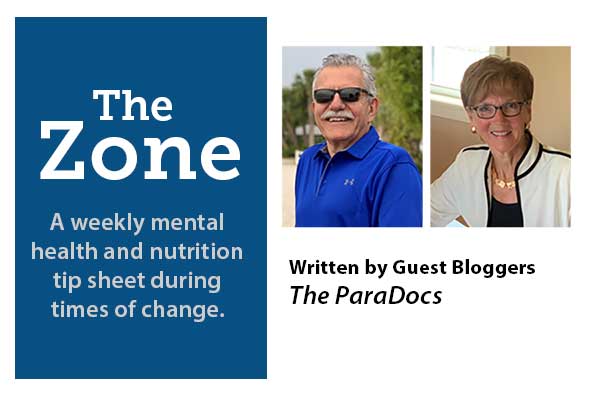Have you spent this time in quarantine simply trying to survive? Learn how to become more aware of your stressors and the symptoms you’re experiencing so you can improve your quality of life, even in these unprecedented times.
In Volume 29 of this guest series, psychotherapist, Dr. Francis L. Battisti, and nutritionist, Dr. Helen Battisti, help us to reflect on our stress, how it has manifested symptomatically, and how we can improve our situations.
For over 10 years, they have worked closely with us on aging concerns and have presented many webinars and in-person workshops. Their newsletter, The Zone, is a weekly mental health and nutrition tip sheet during times of change.
The past two volumes of The ZONE have discussed change and how we typically navigate it. In this volume we will look at the first two Stages of Change and how to use them to manage chronic stress as opposed to episodic stress. Chronic stress is identified as long-term stress resulting from repeated exposure to situations that lead to the release of stress hormones. This prolonged exposure causes wear and tear on our mind, spirt, and body.
We develop coping strategies to handle stress throughout our lives. These strategies can be functional or dysfunctional. Experiencing long-term stress and utilizing long-standing dysfunctional coping strategies can magnify the results. Psychological denial, convincing ourselves of the opposite to what the facts say and what others tell us, disengagement, and substance abuse are examples of dysfunctional coping strategies. While these strategies may have enabled us to survive in the past, they now will only cause pain and inhibit our functionality on emotional, spiritual, and physical levels.
In the Pre-contemplative stage of change we are either not aware or unwilling to acknowledge the level of dysfunction we may be experiencing. To move from the Pre-Contemplative to Contemplative stage, we need to increase our awareness of the effects that long-term stress has on us. Some emotional symptoms of unrecognized chronic stress can include becoming easily agitated, frustrated, moody; feeling overwhelmed, like you are losing control or need to take control; having difficulty relaxing and quieting our minds and feeling bad about yourself, lonely, worthless, and depressed.
Healthy strategies that can assist us to move from the Pre-contemplative to the Contemplative stage include educating ourselves further on the harmful effects of unrecognized chronic stress. Furthermore, as we recognize some of these symptoms in ourselves, we may want to reach out to trusted individuals for confirmation. If we cannot recognize the existence of negative effects, we will not be able to move to the Contemplative stage. Awareness is the key to this healthy movement. Once the reality of our dysfunctional coping strategies is recognized we can then move to the Contemplative stage and mobilize ourselves to change, or not to. The decision will be ours to make.
Key Takeaways
- Denial, although sometimes unconscious, comes with a high cost to mind, spirit, and body.
- Uncovering denial, while painful, can help us see the light at the end of the tunnel.
- Moving from Pre-contemplative to Contemplative is a key to enriching our journey.
Best Practices
- Do an assessment of your emotional, spiritual, and physical health.
- Schedule overdue appointments with the professionals that can assist us with this assessment including our physician, dentist or therapist.
- Practice flexible thinking.
Things to Limit
- Negative self-talk.
- Keeping our head in the sand.
- Thinking that no action is the only action.
In summary, successful coping with long-term chronic stress can be identified as meeting day to day activities, engaging with others and being aware of the health of our mind, spirit, and body. To reach this level of functionality we need to be aware of when change in our lives is needed.
Quote of the Week
“Positive self-talk is to emotional pain as a pain pill is to physical pain.”
–Edmond Mbiaka

